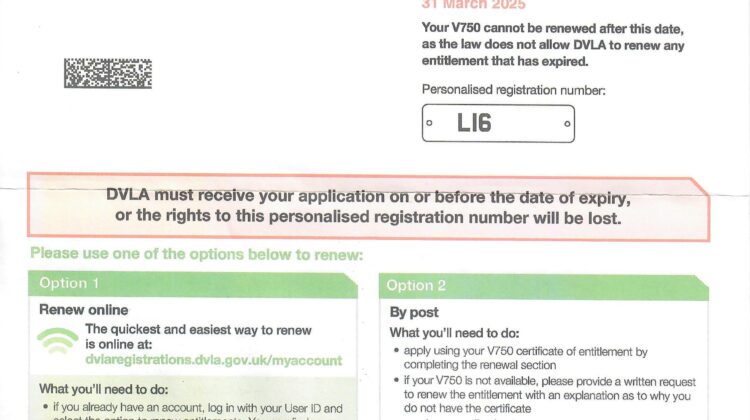
Understanding V750 and V778 Certificates
The Certificate of Entitlement (V750) and the Retention Document (V778) are official documents issued by the Driver and Vehicle Licensing Agency (DVLA) in the UK. These certificates pertain to personalised number plates, confirming the right of the registered owner to display the unique registration on a vehicle.
- V750 (Certificate of Entitlement): This is issued when you buy a new personalized number plate from the DVLA or an authorised dealer. It proves that you are entitled to assign the personalised registration to a vehicle.
- V778 (Retention Document): This is issued when you decide to retain a personalised number plate without assigning it to a vehicle. It allows you to keep the rights to the registration for future use.
Why Renewal is Necessary
Both the V750 and V778 certificates have an expiration date. Typically, they are valid for ten years, after which they must be renewed to maintain the entitlement or retention of the personalised number plate. Failing to renew these certificates can result in the loss of the registration rights, meaning you may no longer be able to assign the plate to a vehicle.
A huge amount of certificates were issued in 2015 when the annual renewal ceased, these are all now becoming due for renewal.
Renewal Process
Renewing the V750 and V778 certificates is a straightforward process. Here’s how you can ensure your personalised number plates remain valid and under your ownership:
- Check Expiry Date: Keep an eye on the expiration date of your V750 or V778 certificate. The DVLA usually sends a reminder before the certificate expires, but it’s good practice to be proactive and check the date yourself.
- Complete the Renewal Form: The DVLA provides a renewal form for both V750 and V778 certificates. This form can be found on the DVLA website or obtained by contacting the DVLA directly.
- Provide Necessary Details: Fill in the required details on the renewal form. This includes your personal information, the registration number of the personalized plate, and any relevant documents that may be needed to support your application.
- Submit the Application: Once the form is completed, submit the application to the DVLA. If applying online, the process is quicker and more convenient. If applying by post, ensure all documents are included and sent to the correct DVLA address.
- Receive the Renewed Certificate: After processing the renewal application, the DVLA will issue a new V750 or V778 certificate with an updated expiration date. This certificate will be sent to your registered address.
Please contact the team at Regplates.com to discuss the renewal.
Important Considerations
- Timely Renewal: Renewing the certificate before it expires is crucial to avoid any potential loss of rights to the personalised number plate.
- Change of Address: If you change your address, inform the DVLA to ensure you receive renewal reminders and the new certificate at the correct location.
- Lost or Damaged Certificates: If your V750 or V778 certificate is lost or damaged, you can apply for a replacement through the DVLA. This process involves providing proof of identity.
The concept of renewing certificates has evolved over time to ensure that individuals and organizations maintain up-to-date qualifications, compliance, and rights. Let’s explore the history and significance of certificate renewals across different domains.
Early Beginnings
The practice of issuing certificates dates back centuries, with early examples including guild memberships, trade licenses, and academic diplomas. These certificates served as proof of skills, qualifications, and rights, often granted for a lifetime without the need for renewal.
Industrial Revolution and Professionalization
During the Industrial Revolution, the rapid growth of industries and professions led to the establishment of formal certification systems. As new technologies and practices emerged, it became essential to ensure that professionals remained competent and up-to-date. This period saw the introduction of periodic renewals for certain certificates, particularly in fields like engineering, medicine, and education.
20th Century: Standardization and Regulation
The 20th century brought significant advancements in standardization and regulation across various sectors. Governments and professional bodies recognized the need for ongoing education and compliance to maintain high standards of practice. This led to the implementation of renewal requirements for many certificates, including:
- Driving Licenses: To ensure road safety, driving licenses began to require periodic renewals, often with medical examinations for older drivers.
- Professional Certifications: Fields such as healthcare, law, and finance introduced continuing education requirements and periodic renewals to ensure practitioners stayed current with industry developments.
- Safety and Compliance Certificates: Industries like construction, food safety, and environmental protection implemented renewal processes to maintain compliance with evolving regulations and standards.
Digital Age and Modern Practices
The digital age has further transformed the landscape of certificate renewals. Online platforms and databases have made it easier to manage and track certifications, while also enabling more efficient renewal processes. Key developments include:
- Online Renewals: Many certificates can now be renewed online, streamlining the process and reducing administrative burdens.
- Automated Reminders: Digital systems can send automated reminders to certificate holders, ensuring they are aware of upcoming renewal deadlines.
- Continuing Education and Training: Online courses and training programs have made it more accessible for individuals to fulfill renewal requirements and stay updated with industry advancements.

Jon Cherry is a Director of leading personalised number plate dealer Regplates.com. Jon has over 25 years industry experience handling some of the most expensive plates ever sold with many high profile and celebrity clients. Active since 1991 in the number plate industry, Jon is currently Chairman of the Cherished Numbers Guild, a trade body representing number plate dealers in the UK. Jon has written many articles on the industry and insight into the future of numberplates and the market as a whole.




